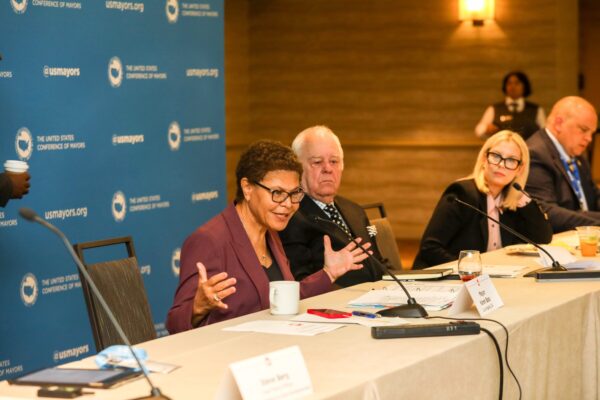By Jose Herrera
While a national convening of mayors in Los Angeles on Thursday resulted in robust discussions and helped formulate the makings of an action plan to address homelessness, city leaders said the federal government must do more to support housing efforts.
“All of us here understand that solving homelessness is addressing an emergency that is taking place in so many of our cities,” Mayor Karen Bass said during an afternoon news conference in downtown Los Angeles.
The U.S. Conference of Mayors convened a two-day conference meant to coordinate a national strategy to combat the homelessness crisis, share successful practices and build national momentum on the issue. Mayors from across the country and several from California arrived Wednesday, according to Bass’ office.
Bass, who serves as chair of the USCM’s Homelessness Task Force, said the mayors will “seek to develop a push for change and for resources that are needed to end homelessness.”
Bass emphasized that mayors “bear the responsibility” to make sure that no one is left without housing, without support services and left to live and die on the streets.
Hillary Schieve, Reno mayor and president of the USCM, stressed that the crisis is not just about housing, but mental health and addiction, what she believes is the country’s “number one crisis.”
“I’m super grateful that … we’ve been on the Hill,” Schieve said, referring to their visits to Capitol Hill and the White House. “We were in front of (Nancy) Pelosi and (Kevin) McCarthy and said we mayors need help.”
She added, “Most people don’t realize the funding never even comes to our cities. It goes to our counties and states, and we literally have to fight for it as far as we possibly can because we are at ‘ground zero.'”
Toledo, Ohio, Mayor Wade Kapszukiewicz, the chair of USCM’s Community Development and Housing Committee, said it’s through their committee that they advocate for change at the federal level.
He noted that in recent years federal leaders have made big investments in infrastructure and clean energy. While most cities have benefited from investments such as the American Rescue Plan, housing “got left on the cutting room floor in a very real way.”
“We would encourage them to re-engage and provide the help and resources that we need because inaction has proved too costly,” Kapszukiewicz said.
According to Kapszukiewicz, the country needs about 7 million units of affordable housing. Making matters worse, every single day the country loses about 10,000 to 15,000 units, he added.
Additionally, there are roughly $70 billion worth of capital improvements that need to be made with public housing.
“We are now coming up on, among the solutions that we believe we need to do is, frankly, a dramatic increase in housing vouchers. We believe we need more federal protections from evictions and more emergency rental assistance,” Kapszukiewicz said.
Mayors stressed that building affordable housing is not enough, there is also a need to provide services addressing mental health, substance abuse and more.
The USCM will be advocating for the changes. They mayors announced an upcoming trip to Washington, D.C. sometime in January.
Bass and Schieve highlighted the efforts of Houston Mayor Sylvester Turner to address homelessness in his city.
Turner, who announced he will be leaving office in about a month and a half, and will not run for reelection due to term limits, touted his success in reducing homelessness. During his years of service, the city of Houston decommissioned 113 encampments and reduced homelessness by 65%.
He noted that based on their data, 90% of unhoused individuals taken off the streets remained off the streets two years later. Turner expressed his gratitude with the USCM for providing a space to learn and collaborate with mayors across the country.
Bass emphasized the lessons learned from mayors in other cities can be taken and applied elsewhere.
“I want to tell the people across the country, we need to work in collaboration with others to eliminate homelessness, and it’s taking place now — each and every single day,” Turner said.
As part of the conference, the mayors also visited Skid Row to see the “magnitude of the crisis,” and stopped by the Hilda L. Solis Care First Village to see a “successful example of eliminating barriers to building temporary housing.”







